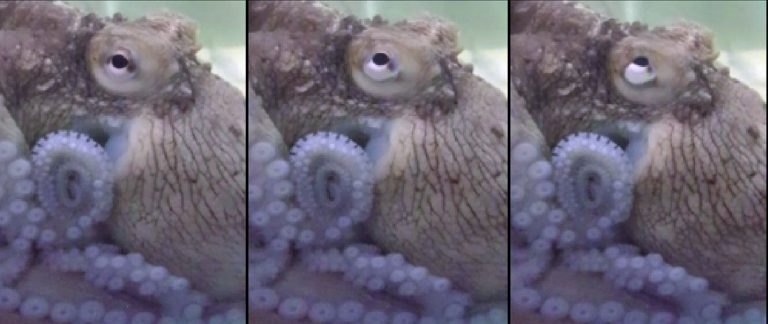DIVING NEWS
The next time you see a stationary octopus while scuba diving and you have time to spare, you might like to keep it under observation to see if it’s awake, asleep – or dreaming.
Octopuses were known to change colour while asleep, and it had been suggested that this might be caused by dreaming, but until recently only mammals and birds were thought to exhibit distinct sleep states. Now research has shown that these colour-changing patterns characterise two alternating sleep states – one “quiet”, the other “active”.
Also read: Hogfish ‘take photos of own skin from inside’
During quiet sleep octopuses remain motionless, their skin pale and their eyes tightly closed slits. By contrast, the report says that active sleep is characterised by changes in skin colour and texture as well as flickering eye movements, contracting suckers on the arms and muscle twitches on the body.
The research was led by octopus neuroscientist Sylvia Medeiros of the Brain Institute at Brazil’s Federal University of Rio Grande do Norte. She and her team caught four wild octopuses of the species Octopus insularis, found only off the Brazilian coast, and transferred them to her laboratory to be closely observed once they had acclimatised.
The octopuses mostly remained pale and still in quiet sleep but transitioned into brief bursts of active sleep, from a few seconds to no more than a minute. Active sleep states typically occurred after at least six minutes of quiet sleep, and the alternation between the two sleep states would repeat in cycles at 30-40min intervals.
Various stimulation tests were used to confirm that the octopuses remained asleep. When a live crab was shown moving on a video screen, or vibrations were created in the water by gently hammering on the tank walls, the octopuses showed little to no response compared to when they were in an alert state.
Their behaviour echoes that of humans, where rapid eye movement, elevated heart rate and irregular breathing indicates a vivid dream state. However, their sleep patterns are likely to have evolved independently in vertebrates and cephalopods in response to comparable environmental pressures.
The scientists believe that the behaviour exhibited by octopuses during their active sleep states suggests that they could be experiencing a similar phenomenon to dreaming, albeit very briefly. Medeiros has likened the experience to watching brief video clips or gifs as opposed to experiencing complex sequences.
Dreaming has been connected to learning in humans, allowing the brain to make vital connections between new data and past experiences, so the scientists would like to know whether the same function might apply in octopuses – although testing that proposition could prove challenging. The study is published in iScience.
RELATED ARTICLES ON DIVERNET:

